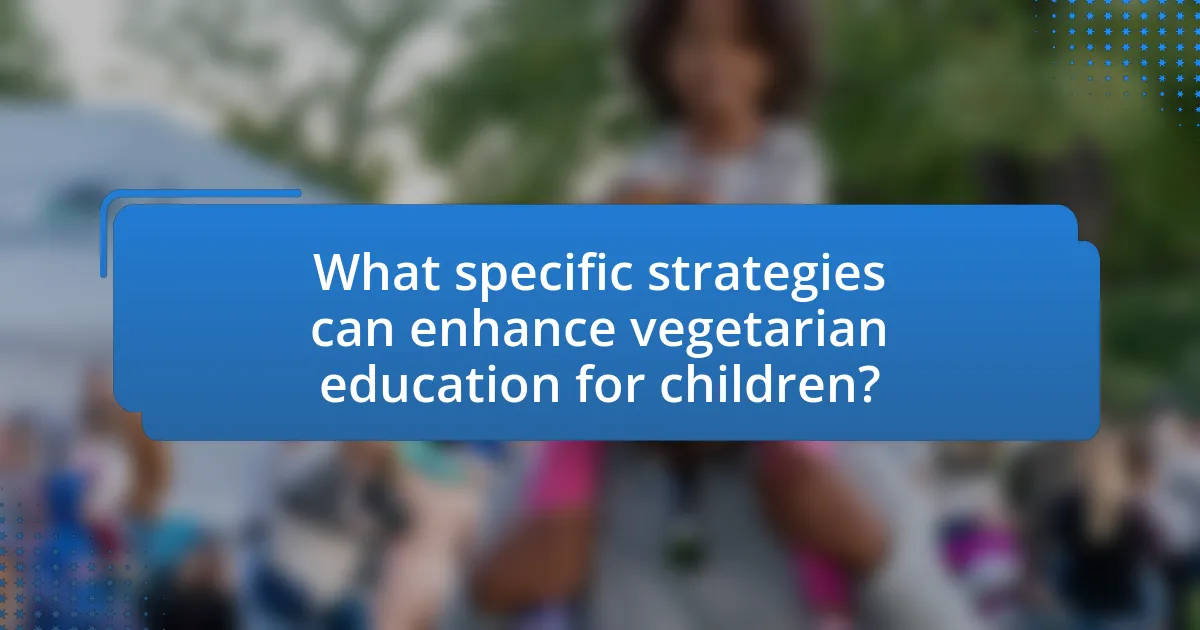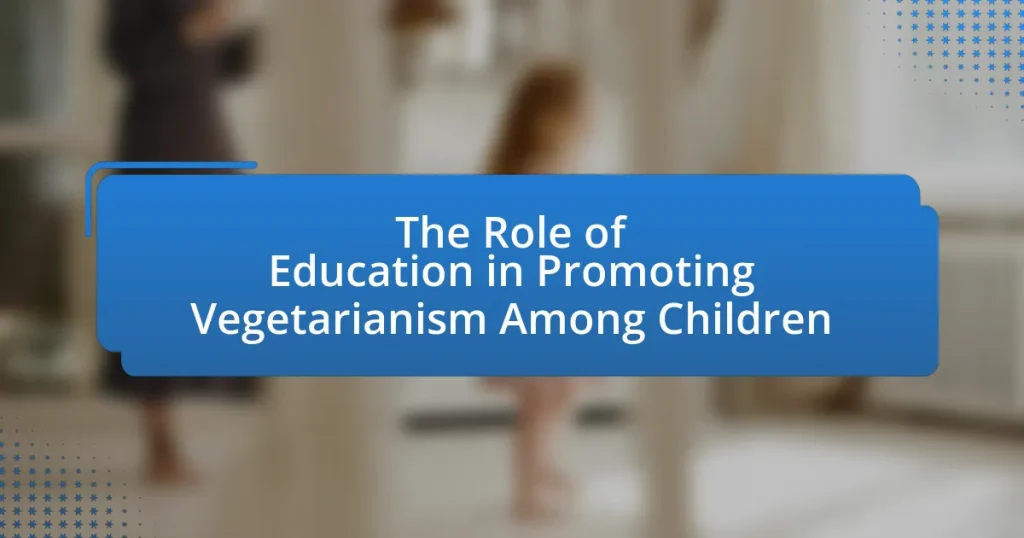The article examines the critical role of education in promoting vegetarianism among children, highlighting how structured curricula can enhance knowledge about nutrition, ethical considerations, and environmental impacts of meat consumption. It discusses the influence of educational methods, such as interactive learning and hands-on cooking classes, on children’s dietary choices and their understanding of nutrition. The article also addresses the health benefits associated with vegetarian diets for children, the importance of fostering environmental awareness, and the challenges educators face in promoting vegetarianism. Additionally, it explores the long-term impacts of vegetarian education on children’s dietary habits and advocacy for animal rights.

What is the Role of Education in Promoting Vegetarianism Among Children?
Education plays a crucial role in promoting vegetarianism among children by providing knowledge about nutrition, ethical considerations, and environmental impacts associated with meat consumption. Through structured curricula, children learn the health benefits of a plant-based diet, such as reduced risks of chronic diseases, which can influence their dietary choices. Additionally, educational programs that incorporate discussions on animal welfare and sustainability can foster empathy and awareness, encouraging children to adopt vegetarianism as a lifestyle choice. Research indicates that children exposed to such educational initiatives are more likely to embrace vegetarian diets, as evidenced by studies showing increased plant-based food consumption in schools that implement nutrition education programs.
How does education influence children’s dietary choices?
Education significantly influences children’s dietary choices by providing knowledge about nutrition, food sources, and the benefits of healthy eating. Research indicates that children who receive education on dietary practices are more likely to make healthier food selections, including increased consumption of fruits and vegetables. For instance, a study published in the Journal of Nutrition Education and Behavior found that nutrition education programs in schools led to a 25% increase in fruit and vegetable intake among participating students. This demonstrates that structured educational interventions can effectively shape children’s understanding and preferences regarding their diets, promoting healthier eating habits and potentially encouraging vegetarianism.
What educational methods are most effective in teaching about vegetarianism?
Interactive and experiential learning methods are most effective in teaching about vegetarianism. These methods include hands-on cooking classes, garden-based education, and field trips to farms or markets, which engage children directly with food sources and preparation. Research indicates that experiential learning increases knowledge retention and fosters positive attitudes toward plant-based diets. For instance, a study published in the Journal of Nutrition Education and Behavior found that children who participated in cooking classes showed a significant increase in their willingness to try vegetarian foods compared to those who received traditional lectures. This evidence supports the effectiveness of interactive methods in promoting vegetarianism among children.
How do children’s understanding of nutrition impact their food choices?
Children’s understanding of nutrition significantly impacts their food choices by influencing their preferences for healthier options. When children are educated about the benefits of various food groups, they are more likely to select fruits, vegetables, and whole grains over processed foods. Research indicates that children who receive nutrition education demonstrate improved dietary habits, such as increased fruit and vegetable intake, which aligns with findings from the Journal of Nutrition Education and Behavior, where authors noted that nutrition knowledge correlates with healthier food selections among youth. This understanding fosters a greater awareness of the health implications of their choices, leading to a preference for nutritious foods that support their overall well-being.
Why is promoting vegetarianism important in childhood education?
Promoting vegetarianism in childhood education is important because it fosters healthier eating habits and environmental awareness from a young age. Research indicates that children who learn about plant-based diets are more likely to adopt these habits, leading to reduced risks of obesity and chronic diseases. For instance, a study published in the Journal of Nutrition Education and Behavior found that children exposed to vegetarian meal options showed increased consumption of fruits and vegetables, which are essential for their growth and development. Additionally, educating children about the environmental impact of meat production can cultivate a sense of responsibility towards sustainability, as livestock farming significantly contributes to greenhouse gas emissions. Thus, integrating vegetarianism into childhood education not only promotes individual health but also encourages a more sustainable future.
What health benefits are associated with a vegetarian diet for children?
A vegetarian diet for children is associated with several health benefits, including improved nutrient intake, lower risk of obesity, and reduced incidence of chronic diseases. Research indicates that vegetarian children often consume higher amounts of fruits, vegetables, whole grains, and legumes, which contribute to essential vitamins and minerals necessary for growth and development. A study published in the Journal of the American Dietetic Association found that vegetarian children have a lower body mass index (BMI) compared to their non-vegetarian peers, indicating a reduced risk of obesity. Additionally, a vegetarian diet is linked to lower cholesterol levels and a decreased risk of heart disease and type 2 diabetes later in life, as supported by findings from the American Heart Association.
How does vegetarianism contribute to environmental awareness among children?
Vegetarianism contributes to environmental awareness among children by fostering an understanding of the ecological impact of food choices. When children learn about vegetarianism, they become aware that plant-based diets typically require fewer natural resources, such as water and land, compared to meat production. For instance, studies indicate that producing one kilogram of beef requires approximately 15,000 liters of water, while producing one kilogram of vegetables requires significantly less. This knowledge encourages children to consider sustainability and the importance of reducing carbon footprints associated with animal agriculture. By integrating vegetarianism into educational curricula, children can develop a sense of responsibility towards the environment, leading to more informed and conscientious lifestyle choices.
What challenges do educators face in promoting vegetarianism?
Educators face several challenges in promoting vegetarianism, primarily including cultural resistance, lack of resources, and insufficient training. Cultural resistance arises as many students come from families with strong meat-based dietary traditions, making it difficult for educators to advocate for vegetarianism without facing pushback. Additionally, a lack of resources, such as access to vegetarian meal options in school cafeterias, limits the ability of educators to provide practical examples of vegetarian diets. Insufficient training on nutrition and dietary diversity further hampers educators’ effectiveness in teaching the benefits of vegetarianism, as they may not feel confident in addressing students’ questions or concerns about nutritional adequacy. These challenges collectively hinder the successful promotion of vegetarianism in educational settings.
How can cultural beliefs affect children’s acceptance of vegetarianism?
Cultural beliefs significantly influence children’s acceptance of vegetarianism by shaping their perceptions of food and dietary practices. For instance, in cultures where vegetarianism is associated with spiritual or ethical values, children are more likely to adopt vegetarian diets as they internalize these beliefs from their families and communities. Research indicates that children raised in vegetarian households often develop a positive attitude towards plant-based diets, as seen in studies like “The Influence of Family and Culture on Children’s Food Choices” published in the Journal of Nutrition Education and Behavior, which highlights how cultural norms and family practices directly impact children’s eating habits. Thus, cultural beliefs serve as a framework that can either encourage or discourage children’s acceptance of vegetarianism.
What misconceptions about vegetarian diets do children commonly have?
Children commonly believe that vegetarian diets lack sufficient protein and essential nutrients. This misconception arises from the idea that meat is the primary source of these nutrients, leading children to think that without meat, they cannot meet their dietary needs. However, numerous studies indicate that a well-planned vegetarian diet can provide adequate protein through sources like beans, lentils, tofu, and dairy products. Additionally, research published in the Journal of the American Dietetic Association highlights that vegetarian diets can meet all nutritional requirements when properly balanced, dispelling the myth that they are inherently deficient.
How can schools effectively implement vegetarian education programs?
Schools can effectively implement vegetarian education programs by integrating plant-based nutrition into the curriculum and providing hands-on cooking classes. Research indicates that educational interventions, such as those outlined in the “School-Based Nutrition Education Programs” study by the Journal of Nutrition Education and Behavior, show that students who participate in structured nutrition education are more likely to adopt healthier eating habits, including increased vegetable and fruit consumption. Additionally, schools can collaborate with local farms to facilitate field trips and workshops, enhancing students’ understanding of food sources and sustainability. This multifaceted approach not only educates students about vegetarianism but also fosters a culture of healthy eating within the school community.
What role do parents play in supporting vegetarian education?
Parents play a crucial role in supporting vegetarian education by modeling dietary choices and providing information about the benefits of a vegetarian lifestyle. Their active involvement can influence children’s attitudes towards vegetarianism, as studies show that children are more likely to adopt dietary habits that reflect their parents’ choices. For instance, research published in the Journal of Nutrition Education and Behavior indicates that parental dietary practices significantly affect children’s food preferences and consumption patterns. By engaging in discussions about nutrition, cooking vegetarian meals together, and encouraging exploration of plant-based foods, parents can foster a positive environment for vegetarian education.

What specific strategies can enhance vegetarian education for children?
Interactive cooking classes can enhance vegetarian education for children by engaging them in hands-on experiences that promote understanding of plant-based foods. Research indicates that children who participate in cooking activities are more likely to try new foods and develop healthier eating habits. For instance, a study published in the Journal of Nutrition Education and Behavior found that children who attended cooking classes showed increased willingness to consume fruits and vegetables. Additionally, incorporating storytelling and educational games about nutrition can further reinforce the benefits of vegetarian diets, making the learning process enjoyable and memorable.
How can interactive activities promote understanding of vegetarianism?
Interactive activities can enhance understanding of vegetarianism by engaging children in hands-on experiences that illustrate the benefits and principles of a plant-based diet. For instance, cooking classes that focus on vegetarian recipes allow children to explore the variety of plant-based foods, fostering a deeper appreciation for their nutritional value and culinary potential. Research indicates that experiential learning, such as participating in gardening or food preparation, significantly increases knowledge retention and positive attitudes towards healthy eating habits. A study published in the Journal of Nutrition Education and Behavior found that children who participated in interactive cooking programs showed improved dietary choices and a greater willingness to try new foods, including vegetables. This evidence supports the effectiveness of interactive activities in promoting a comprehensive understanding of vegetarianism among children.
What types of hands-on experiences can be integrated into the curriculum?
Hands-on experiences that can be integrated into the curriculum include cooking classes focused on vegetarian meals, gardening projects where students grow their own vegetables, and field trips to local farms or farmers’ markets. Cooking classes allow students to learn about nutrition and meal preparation, fostering an appreciation for plant-based foods. Gardening projects provide practical knowledge about food sources and sustainability, enhancing students’ connection to their food. Field trips to farms or markets expose students to local agriculture and the benefits of consuming fresh, plant-based produce. These experiences collectively support the educational goal of promoting vegetarianism among children by engaging them in practical, real-world applications of their learning.
How can cooking classes influence children’s perceptions of vegetarian food?
Cooking classes can positively influence children’s perceptions of vegetarian food by providing hands-on experience and knowledge about plant-based ingredients. Engaging children in the cooking process allows them to explore the flavors, textures, and nutritional benefits of vegetarian meals, fostering a sense of curiosity and appreciation. Research indicates that children who participate in cooking classes are more likely to try and enjoy vegetables, as they develop a personal connection to the food they prepare. For instance, a study published in the Journal of Nutrition Education and Behavior found that children who engaged in cooking activities showed increased willingness to consume fruits and vegetables, highlighting the effectiveness of experiential learning in shaping dietary preferences.
What resources are available for educators to teach vegetarianism?
Educators can access a variety of resources to teach vegetarianism, including curriculum guides, lesson plans, and interactive materials. Organizations such as the Vegetarian Resource Group provide comprehensive educational resources, including lesson plans tailored for different age groups and topics related to nutrition, ethics, and environmental impact. Additionally, websites like ChooseVeg.com offer free downloadable resources, including activity sheets and presentations that can be used in classrooms. Research indicates that integrating vegetarianism into school curricula can enhance students’ understanding of nutrition and promote healthier eating habits, as shown in studies published by the Journal of Nutrition Education and Behavior.
Which books and materials are recommended for teaching children about vegetarianism?
Recommended books and materials for teaching children about vegetarianism include “The Vegetarian Resource Group’s Guide to Vegetarianism” and “The Kids’ Vegetarian Cookbook” by Jennifer McCann. These resources provide age-appropriate information and recipes that engage children in understanding vegetarianism. Additionally, “Why Should I Eat Well?” by Claire Llewellyn introduces the concept of healthy eating, including vegetarian options, in a relatable manner for young readers. These materials are effective in promoting awareness and understanding of vegetarianism among children, as they combine educational content with practical activities.
How can online platforms support vegetarian education initiatives?
Online platforms can support vegetarian education initiatives by providing accessible resources, interactive content, and community engagement opportunities. These platforms can host educational videos, articles, and webinars that explain the benefits of vegetarianism, including health advantages and environmental impacts. For instance, research indicates that children exposed to plant-based diets show improved health outcomes, such as lower obesity rates (American Journal of Clinical Nutrition, 2020). Additionally, online forums and social media groups can facilitate discussions among parents and educators, fostering a supportive community that shares recipes, tips, and experiences related to vegetarianism. By leveraging technology, online platforms can effectively disseminate information and create a collaborative environment that encourages the adoption of vegetarian lifestyles among children.

What are the long-term impacts of vegetarian education on children?
Vegetarian education has long-term impacts on children, including improved health outcomes, enhanced environmental awareness, and increased ethical considerations regarding animal welfare. Research indicates that children educated about vegetarianism tend to adopt healthier eating habits, leading to lower risks of obesity and related diseases. A study published in the Journal of Nutrition Education and Behavior found that children who participated in vegetarian education programs showed significant improvements in their fruit and vegetable intake. Additionally, these children often develop a greater understanding of environmental sustainability, as vegetarian diets are associated with lower carbon footprints. Furthermore, ethical education surrounding vegetarianism fosters compassion and empathy towards animals, influencing children’s moral development.
How does early education about vegetarianism affect lifelong dietary habits?
Early education about vegetarianism significantly influences lifelong dietary habits by instilling values and knowledge regarding plant-based diets from a young age. Research indicates that children exposed to vegetarian principles are more likely to adopt and maintain vegetarian or plant-based eating patterns into adulthood. A study published in the journal “Appetite” found that early exposure to vegetarianism correlates with increased awareness of health, environmental, and ethical issues related to food choices, leading to more conscientious eating behaviors later in life. This foundational education shapes preferences and attitudes, making individuals more inclined to choose vegetarian options as they grow older.
What evidence exists linking childhood vegetarian education to adult dietary choices?
Evidence linking childhood vegetarian education to adult dietary choices includes studies showing that individuals exposed to vegetarian principles during childhood are more likely to adopt and maintain vegetarian or plant-based diets in adulthood. Research published in the journal “Appetite” by authors including D. A. H. H. van der Meer and colleagues indicates that early exposure to vegetarianism significantly influences long-term dietary preferences, with findings suggesting that children educated about vegetarianism develop a greater awareness of ethical, environmental, and health-related reasons for dietary choices. Additionally, a longitudinal study in “Nutrients” by authors such as J. A. Sabaté and colleagues found that childhood dietary habits, including vegetarian education, are strong predictors of adult dietary patterns, reinforcing the notion that early education plays a crucial role in shaping lifelong eating behaviors.
How can vegetarian education influence children’s advocacy for animal rights?
Vegetarian education can significantly influence children’s advocacy for animal rights by fostering empathy and awareness about animal welfare. When children learn about the ethical implications of meat consumption and the treatment of animals in the food industry, they are more likely to develop a compassionate perspective towards animals. Research indicates that educational programs focusing on vegetarianism can enhance children’s understanding of animal sentience and the moral considerations surrounding their treatment. For instance, a study published in the Journal of Animal Ethics found that children exposed to lessons about vegetarianism showed increased concern for animal rights and a greater willingness to advocate for humane treatment. This connection between vegetarian education and advocacy is reinforced by the development of critical thinking skills, enabling children to articulate their beliefs and engage in discussions about animal rights effectively.
What best practices should educators follow when teaching about vegetarianism?
Educators should incorporate interactive and engaging methods when teaching about vegetarianism. Utilizing hands-on activities, such as cooking demonstrations or garden projects, can enhance students’ understanding of plant-based diets. Research indicates that experiential learning increases retention and interest in nutritional topics, as shown in a study published in the Journal of Nutrition Education and Behavior, which found that students who participated in cooking classes were more likely to adopt healthier eating habits. Additionally, providing factual information about the environmental, health, and ethical benefits of vegetarianism can foster informed discussions. This approach aligns with educational standards that emphasize critical thinking and informed decision-making.


